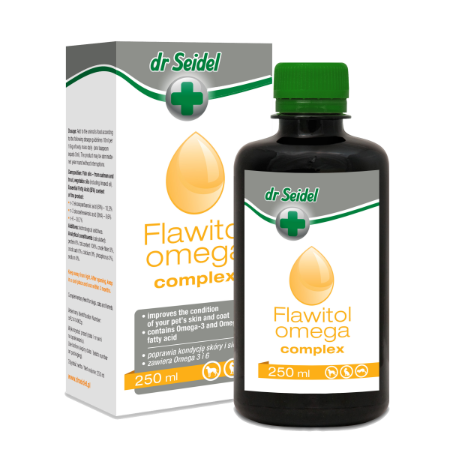Senior dog supplementation
Senior dog supplementation
Nutrition and supplementation of a senior dog is of great importance for the proper functioning of the body, condition and well-being of our pet.
When to say that the animal is a senior? A large breed dog enters seniority after 7 years of age; smaller breeds of dogs and cats after about 10 years of age.
Most systems and organs will require support and appropriate supplementation once the animal enters this age. The first worrying symptom that the owner may notice in its senior animal is the difficulty in moving around, getting up from bed or climbing stairs. Degenerative changes in the spine or joints of the limbs can affect the feeling of pain, which can reduce the animal’s mobility, cause limping or even loss of appetite. If the condition does not qualify for orthopaedic surgery, we can support the joints with preparations containing glucosamine, chondroitin, grapple plant or omega 3 acids (Flawitol Omega artro). Regular use of such supplements reduces pain symptoms, has an anti-inflammatory effect and stimulates collagen production in cartilage.
Muscle tissue also weakens with age. Catabolic processes begin to prevail and muscle atrophy occurs, resulting in mobility difficulties. In this case, we can use preparations from HMB (Dr Seidel HMB) delaying the breakdown of muscle proteins and improving the animals’ mobility. Such a supplement is also recommended for older animals with cancer accompanied by impoverishment of the body.
A geriatric patient may also have nervous system problems. Worse sight, hearing or memory in an elderly person does not surprise us, and it can be similar with elderly animals. Preparations with lecithin may be helpful here (Flawitol omega 3 with lecithin) as they delay the occurrence of neurodegenerative changes associated with brain ageing, and improve memory. It is also worthwhile to supplement a senior dog’s diet with omega 3 acids, which improve immunity, support the cardiovascular system and skin and its products (hair, claws) (Flawitol omega complex).
In old age, the metabolism also slows down, so the diet of a senior animal deserves special attention. Properly balanced, it should have reduced protein levels (with high digestibility), as well as a reduced energy supply and increased dietary fibre content to maintain a healthy body weight and prevent constipation. We should keep this in mind also when treating our pets with all kinds of snacks. It is best to choose functional snacks, e.g. with lecithin, (Seidel Snacks for Senior Dogs) and not just those that contain empty calories. Another problem in an older dog may be a condition of its teeth and gums and bad breath. Unfortunately, not every senior dog will be eligible for a scaling procedure (which should be performed in anaesthesia), due to its general health condition. It is therefore extremely important to prevent scale build-up and to use preparations in the form of paste (Deo Paste) or spray (Deo Spray). A preparation with chlorophyll can also be used as a supplement, which reduces the bad smell from the snout (Flawitol deo), which also improves the smell of the skin and faeces of an older dog.
Aging is an inevitable process, so when deciding on a puppy, every owner should bear in mind that over time, their young, active dog will need special care and supplements.
Veterinarian Monika Wieczorek-Smolarek
2 октября 2023






